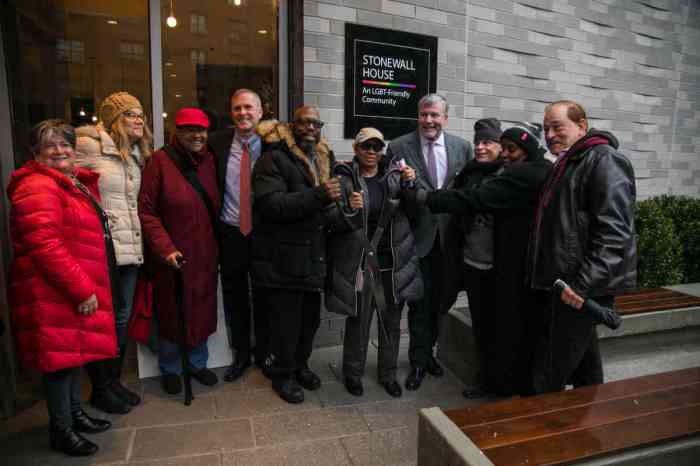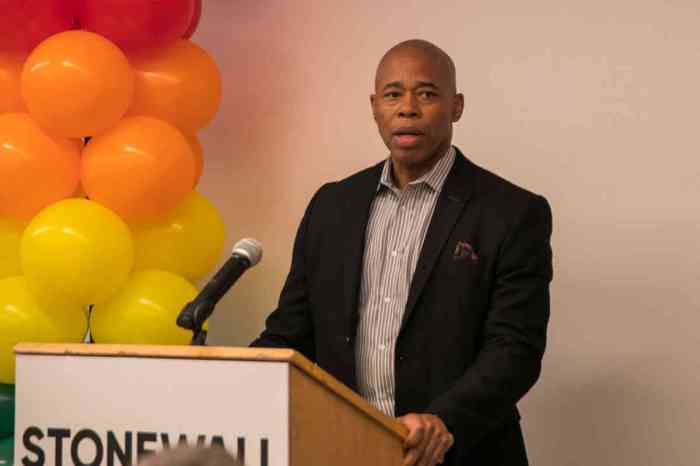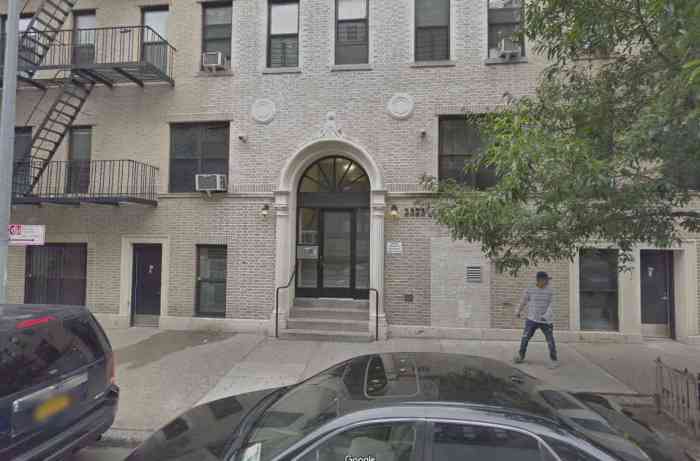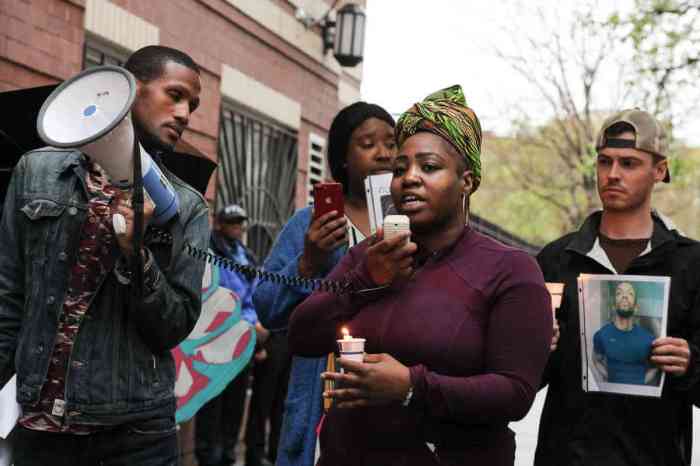Doug Ireland, 1946-2013.
Doug Ireland, a journalist and activist who came of age in the New Left politics of the 1960s and whose interests and professional pursuits ranged from foreign and domestic politics to literature and philosophy, died in his East Village home on October 26.
He was 67 years old, and, according to longtime friends, had suffered in recent years from diabetes, kidney disease, severe sciatica, and weakened lungs and progressive muscle deterioration related to childhood polio. Though no specific cause of death has been established, Ireland survived at least two major strokes over the past several years.
Valerie Goodman, a Manhattan gallery owner who met Ireland when he lived in France three decades ago and was one of the few intimates who spent time with him in recent years while he felt too ill to leave his apartment or have company, said she was contacted by the NYPD after Ireland’s body was found in his home.
Renaissance man, with interests in public affairs, literature, and gossip, enjoyed freewheeling youth, endured years of infirmities
Despite chronic pain, which was at times debilitating, and frequent hospitalizations, Ireland remained a dogged reporter and book critic in recent years, writing articles for nearly every issue of Gay City News –– where he has been the international contributing editor –– since mid-2005 and also reporting on American politics for French-language publications in France.
Ireland’s fierce commitment to his work –– both in politics and journalism –– was a hallmark of his entire life. Anne Hemenway met Ireland when she was only about 12, after he and her father, Russell, had worked the 1968 Democratic National Convention in Chicago on behalf of the peace campaign of Minnesota Senator Eugene McCarthy. According to Anne, the elder Hemenway, who had strong ties to post-World War II progressive Democrats including former First Lady Eleanor Roosevelt and Illinois Governor Adlai Stevenson, recalls that Ireland was “always an activist, committed to civil rights.”
“I think of him as one of the people who never compromised to meet anything less than the highest standard,” Anne Hemenway said. “Somebody’s gotta hold that place, and Douglas held that place… Everyone whom he touched understood how deeply he felt the pain of the world.”
When Russell Hemenway met him in the mid-1960s, Ireland had recently moved on from his early involvement with the Students for a Democratic Society, which he joined as a teenager, and was engaged in political work with labor unions and Democratic candidates. In addition to the McCarthy campaign, he helped organize labor leaders opposed to the Vietnam War, managed the successful 1968 Long Island congressional campaign of anti-war Democrat Allard Lowenstein, and in 1970 ran the insurgent congressional campaign of Bella Abzug, the iconic feminist who ousted a longtime Upper West Side incumbent.
Abzug’s daughter, Liz Abzug, said that Ireland also ran her mother’s 1976 US Senate campaign, in which she was narrowly defeated by Daniel Patrick Moynihan. With Ed Koch, Abzug introduced the first gay rights bill in Congress in 1974.
Joe Kennedy, a member of the Gay Activists Alliance (GAA) in the years immediately after the Stonewall Rebellion, recalled a spontaneous protest in 1971 against a police raid on a West Village gay bar at which Ireland, then a spokesman for the State Assembly Democrats, rallied “passers-by to protest with ‘Gay Power!’ chants.”
“I remember Doug as the first person of his stature as a Political Insider to risk all and come out as gay and a gay activist,” Kennedy wrote in an email message. “It would be hard for anyone too young to remember those times to understand just how bold and radical that was.”
Not everyone, however, voiced a positive assessment of the role Ireland played in LGBT activism in the years that followed. In a widely distributed email following Ireland’s death, David Thorstad, a member of GAA and later the Coalition for Lesbian and Gay Rights, recalled, “Doug functioned as part of the gay wing of the ‘permanent government,’ collaborating with the powers that be to swing policy in a direction he and other Democrats wanted.” The totality of Ireland’s life work, however, “make up for his involvement in such machinations,” Thorstad concluded.
By the mid-1970s, Ireland had shifted his work primarily to journalism, launching a career in which he was a contributor to the New York Post (in its old liberal days), New York magazine, the Nation, the Village Voice, POZ magazine, LA Weekly, and French publications including the daily Libération and the online Bakchich.
The fact that Ireland was so enmeshed in politics served him well as a journalist. Micah Sifry, his editor at the Nation in the 1990s, said, “He was probably the most knowledgeable person I had encountered on the ins and outs of New York politics and national politics. I was always learning at his knee.”
John Berendt, a journalist and the author of “Midnight in the Garden of Good and Evil,” was his editor at New York magazine, where Ireland reported on politics and wrote commentary. Recalling how plugged in Ireland was to the political scene, Berendt explained, “that was why he was so valuable to us.”
If Ireland had an insider’s approach toward LGBT rights in some respects, as Thorstad argued, he was also committed to a liberationist perspective. In a 1978 New York magazine cover story, he wrote about the culture of cruising in Central Park’s Rambles while examining the bursts of anti-gay violence that claimed victims there.
Berendt and Ireland remained close over the following 35 years and when Superstorm Sandy hit last October, Berendt fetched him from his blacked-out East Village apartment to give him refuge on the Upper West Side. Berendt recalled how Ireland, fatigued and largely confined to bed, worked the phones to query Democratic political operatives about how President Barack Obama’s reelection campaign was doing in its final days. “He knew all the players and all the gossip,” Berendt said.
Sean Strub, the founder of POZ, dropped by Berendt’s home one evening while Ireland was staying there, and he recalled that despite Ireland’s muscle deterioration making it difficult for him to hold his head up, he was in top form intellectually. “It was right before the election and for several hours, we got a masters tutorial in what was happening in the global political environment,” Strub wrote in an email message. “I wish I had recorded it.”
Strub, who said Ireland “was an extremely important part of POZ” in its early years, recalled meeting him in 1979 at the first LGBT march on Washington. He “enthralled me with stories of GAA and GLF [the Gay Liberation Front], and how they related to the broader political trends of that era. It made me feel like my small coming out steps at the time were part of a movement continuum, connecting me to something greater than myself.”
Like Anne Hemenway, Strub said that Ireland offered unwavering loyalty to his friends.
“Ever since then, he called me comrade, as he did many others he mentored or admired,” Strub wrote of the years since their first meeting. “It was the highest compliment he could bestow and I treasured hearing it every time.”
At the time of his death, Ireland was eagerly awaiting the chance to review Strub’s forthcoming memoir, “Body Counts,” and in one of the last conversations I had with him, Ireland –– a technophobe, to put it nicely –– warned that computer problems he was having might force him to dictate his book jacket blurb for Strub to this reporter over the phone.
Berendt, recalling Ireland’s work at New York magazine, said that while he “found it easy to criticize those on the right, he was more concerned” with the lack of consistency and principle among liberals and others on the left. He was “an unwavering radical,” Berendt wrote.
In his writing for Gay City News, Ireland gave considerable ink to contemporary queer writers and activists –– including Sarah Schulman, Michael Bronski, Martin Duberman, Urvashi Vaid, and Peter Tatchell –– who, like him, were willing to present radical, probing, and often searing critiques of modern America and established LGBT leadership.
Ireland’s criticism of American gay leaders was never harsher than in regard to what he considered their indifference and inaction on international human rights abuses. In 2005, his first reporting for Gay City News, some of which sparked heated debate with at least some international human rights advocates and observers, involved anti-gay executions and repression carried out by the Iranian regime of President Mahmoud Ahmadinejad. Ireland was also the first Western reporter to detail the wave of murders carried out beginning in late 2005 by Shia death squads in Iraq responding to a death-to-gays fatwa issued by Grand Ayatollah Ali al-Sistani.
Ireland contributed considerable international reporting for Gay City News, including stories on the crackdown on LGBT rights in Russia, Eastern Europe, and Africa, most prominently Uganda. His reporting also gave early exposure to the efforts by Louis-Georges Tin, a university professor and black and gay rights activist in France, to establish the International Day Against Homophobia, which is now recognized every May worldwide. IDAHO emerged as a leading force in pushing for a United Nations declaration calling for the decriminalization of homosexuality, an effort the United States did not support until early in the Obama administration.
Ireland was a harsh critic of US foreign adventures carried out by Republican presidents including Ronald Reagan and both Bushes, but he also zeroed in on what he viewed as temporizing by Democrats. For several years during the Clinton administration, he wrote a syndicated Clinton Watch column, and despite his keen interest in the outcome of last year’s presidential race –– fully aware of the implications of a Republican restoration –– he was often scornful of Obama. In this year’s mayoral race, Ireland voiced harsh criticism of both City Council Speaker Christine Quinn and the winner of the Democratic primary, Public Advocate Bill de Blasio.
Quinn, Ireland told Gay City News' Andy Humm for an article Humm wrote for Gotham Gazette, “is absolutely unacceptable. Bill de Blasio is a total opportunist who believes in nothing.” Comparing this year's Democratic field to the 1977 primary that included Koch, Abzug, Mario Cuomo, and incumbent Mayor Abe Beame, among others, he said, “The level of mediocrity has gotten worse by a factor of 10.”
Attorney Norman Levy, who met Ireland “in politics” in the 1960s and remained a close friend for nearly half a century, remembered that his critiques of Democratic leaders from earlier eras, however, were also withering. “Mario Cuomo,” Ireland wrote, “is the only politician who hides behind his own candor.” And, “I refute the fact that Ed Koch is a closet gay man. He is a closet human being.”
Ireland, Levy said, “is one of the towering intellectuals of our time… and he was certainly a concerned citizen of the world.”
Ireland’s closest friends all attested to the “cloistered” life his ailments forced on him over the past decade, but their memories of him from earlier decades paint a very different picture.
“Doug was very dramatic and flamboyant as a young man,” Anne Hemenway recalled from their encounters in the 1970s. “He was a show stopper, a very charismatic character.” Arriving at gatherings of fellow writers at West Village watering holes such as the Lion’s Head Tavern, Ireland would soon become the center of attention. “A lot of people really loved him, though I’m sure not everyone did,” Hemenway said.
Valerie Goodman, who stayed with Ireland when she first moved to New York from France several decades ago, recalled that he loved good food, preferably French cuisine loaded with “lots of butter,” and had wangled an assignment to visit three-star restaurants for Michelin. “Food was like pornography for Doug,” she recalled. He also “never stopped smoking,” Goodman said, something he continued even as his lung problems multiplied, according to Berendt.
Everyone who knew him in the ‘70s and ‘80s recalled that in those evenings at Manhattan bars, Ireland drank with the best of them. Berendt recalled that “Doug is the only person I know who could write rapidly, rationally, and with absolute clarity even after smoking a couple of joints. While other people would have been reduced to dazed inaction, Doug would blaze ahead, turning out supremely polished copy while stoned.”
Joe Kennedy and Nathan Riley, a Gay City News contributor deeply involved in Democratic politics during that era, remembered many late nights spent drinking but engaging in deep conversations, as well. “Doug was one of the wittiest, funniest, most insightful, and spontaneously eloquent people I've known,” Kennedy said.
Ireland’s writing in recent years fully acknowledged his wild days –– including nights out with the likes of writers Christopher Hitchens and Gore Vidal –– but also made clear that he had sworn off liquor many years before.
In a remarkable remembrance of Hitchens –– whom he referred to as his “queer friend,” due only in part to the author and journalist’s youthful bisexuality –– Ireland wrote with considerable emotion about the loss from AIDS of his “one great love,” Hervé Couergou, whom he met while living in Paris in the 1980s. When Couergou learned of his diagnosis, he told Ireland he wanted to leave France, where he had grown up deeply alienated from his parents. Ireland moved back to New York, where he took a job at the Village Voice and made plans to bring Couergou over. However, the US policy barring the entry of HIV-positive foreigners into the country –– which he bitterly faulted President Bill Clinton for not overturning when he became president –– prevented the couple from making a home here, and Ireland spent the remainder of Couergou’s life working in New York to help pay for his lover’s medical and living expenses in Paris, where even a good public health system fell well short of what was needed.
In the wake of Couergou’s death, Ireland wrote, he “fell into a black hole of despair and depression,” and he credited Hitchens –– known for an often acerbic public persona and with whom he quarreled in print over Hitchens’ support for George W. Bush’s invasion of Iraq –– with helping to save his life. Hitchens, he wrote, “knew me well enough to have sussed out, without being told, that I was seriously considering ending my own life. But he spent several hours making me understand how wrong that would be, how ashamed Hervé would have been had he known he’d caused my death. I will not recount here all that Hitch said to me then, but had it not been for that conversation I might well not be here to write these words.”
Hitchens and Abzug were just two of the literary and political luminaries with whom Ireland shared intimate ties. When Vidal died last year, Ireland also wrote in very personal terms about their friendship, and his final contribution to Gay City News was his review earlier this month of Tim Teeman’s new book on Vidal.
Ireland’s writing in recent years for Gay City News also demonstrated his profound understanding of queer history from the past two centuries. In a number of articles, including a review of Neil McKenna’s groundbreaking biography of Oscar Wilde, he wrote about the periodic waves of anti-gay repression that swept Britain from the turn of the last century through the post-World War II era and into the 1960s, including the lethal persecution of Alan Turing, whose mathematical genius at code-cracking helped save the UK from Nazi invasion. Ireland also had a keen understanding of the censorship of free expression that hobbled gay culture in the US in settings as diverse as the post-World War I period, the McCarthy era, and under John Ashcroft’s Justice Department in the George W. Bush administration. But he also wrote extensively about the early flowering of gay visibility in the US, whether in anarchist circles in the early 20th century or in Harlem and Chicago during the 1920s.
Though Ireland was an unflagging critic of the right and the political middle, he clashed as well with figures on the progressive left. Micah Sifry recalled that it was often “a struggle to get his writing” into the Nation. During the Clinton administration, he said, “Doug’s politics were to the left of the magazine’s. It was not a happy relationship.”
There was a time, Sifry said, when “everyone expected Doug to be the next Jimmy Breslin, but he couldn’t be the next Jimmy Breslin because he was too true to his principles and wouldn’t cut those corners.”
Ireland’s reporting on Iran in the several years after 2005 drew harsh rebuttals from Scott Long, who then ran the gay desk at Human Rights Watch and charged that Ireland and Gay City News generally were uncritical in relying on sources who maintained that two young men hanged in Masshad, Iran in mid-2005 –– after being convicted of raping an underage boy at a time when they themselves were underage –– had in fact been involved in consensual sex. Long and some other human rights advocates criticized activists and reporters, including Ireland and British gay rights veteran Peter Tatchell, who they charged inappropriately turned what was an incident highlighting the barbarity of capital punishment into a gay rights cause célèbre.
As Ireland continued to locate sources within Iran and report on other cases of anti-gay repression, Long became increasingly critical, charging that Ireland and others were imputing a Western gay identity to Iranians coming from a very different cultural experience and that their harsh denunciations of Iran played into the Bush administration’s neo-conservative foreign policy aims.
The conflict between Long on one side and Ireland and Tatchell on the other side was at times vitriolic and led to an extraordinary 2010 episode in which Human Rights Watch and Long apologized in writing to Tatchell. Despite that brief ceasefire in a long-running feud, Long remained a critic of Ireland to the end, most recently faulting him for not earlier criticizing Russian gay activist Nikolai Alexeyev, who in recent months unleashed a stream of anti-Semitic outbursts on social media. Alexeyev’s supporters, Long maintained, “had all the evidence years ago of the man’s instability and hatred.”
Ireland –– who had written extensively about Alexeyev’s role in organizing gay rights demonstrations in Moscow and elsewhere that were brutally shut down and in winning decisions against Russia in the European Court of Human Rights –– wrote an uncompromising rebuke of Alexeyev’s recent behavior in a September issue of Gay City News. It was an essay that encapsulated Ireland’s vision of an ongoing and universal struggle for human rights and dignity.
“Stereotypical fantasies about Jews have no place in gay liberation anywhere on this planet,” he wrote. “Jews, Gentiles, Muslims, queers –– we all have bigotry as our common enemy. And we at Gay City News believe that a united front of unblemished opposition to all of it is our common duty. It’s an obligation of conscience. To be even more precise: Nikolai Alexeyev has now consigned himself to the trash bin of history along with all the other legions of racist zealots. We can only hope that our queer Russian brothers and sisters, who are under the most dire attack, will not be further undermined or tarnished by the unspeakable calumnies he is now broadcasting in their name or demoralized by Alexeyev’s defection to the camp of bigotry.”
Until the end of his life, Ireland wrote and spoke with uncommon clarity, passion, and verve about the world he worked so hard to change. Valerie Goodman, Anne Hemenway, and Norman Levy all acknowledged how difficult Ireland’s infirmities made his life in its final years and how critical is was that he be able to continue working. “He really had no other pleasure in living,” Goodman said. “He felt he needed to write. That’s the only reason he stayed alive.”
“His work was his life,” Levy said, recalling Ireland telling him, “I have nothing else in my life.”
Hemenway, however, noted how vital a force Ireland remained even as he was isolated in his apartment. “He was able to carry out that rich professional life while staying in his chamber,” she said.
Doug Ireland’s body will be cremated and, according to Levy, a memorial service will be planned for a later date.



































